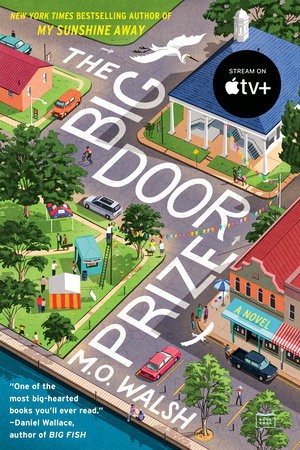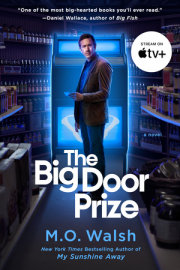1
The Hubbards
After thirty-nine years and eleven-plus months, Douglas Hubbard had finally had enough of being Douglas Hubbard. So, for his fortieth birthday, just last Friday, he bought himself a trombone. It was a thing he'd long wanted and, now that it was purchased, Douglas felt this object made him an entirely new man. He was so excited, in fact, he spent his entire weekend polishing the instrument until it nearly glowed, standing in front of the full-length mirror in his and his wife's bedroom, spinning aloud out magical phrases like Dizzy Douglas, Herbie Hubbard, and Thelonious Doug. He dreamt up enough jazzy nicknames in the first few days alone to sustain several impressive careers and yet had not even put lip to mouthpiece. Why bother? When a person finds as much joy as Douglas did in simply imagining themselves to be someone else, the actual work required to change, along with so many other things they hold dear, can be forgotten.
But tonight, after clumsily blaring his way through his first trombone lesson at a friend's apartment, Douglas Hubbard returned home to his wife, moved aside the wooden birdhouses she'd been building those past months, and set his trombone case down on the table. "Well," he said. "It's official. I can't play a note."
"Don't be silly," his wife said. Then she began to cry.
This was unusual.
Cherilyn Hubbard was typically warm and upbeat at this hour, which she called their wine time, and Douglas always looked forward to seeing her. Through fifteen years of what they would both call a happy and uncomplicated marriage, she had remained redheaded and faithful, busy and beautiful in her unpretentious way, and as quick to offer love and encouragement to Douglas as she'd been on the days he first fell for her. But, on this night, she stood alone at the far end of their modest kitchen and, instead of greeting Douglas with a hug at the door, wiped at her eyes with the undersides of her wrists. She then leaned heavily against their blue-and-white countertop, which was covered in flipped-open magazines. Beside her, a pot of water boiled quietly on the stove. Near the sink, a box of macaroni and cheese stood unopened. Next to that, Douglas knew, because the day was Wednesday, two hamburger patties sizzled over low, greasy heat in the skillet.
Douglas said nothing. He instead removed the blazer he had draped over his arm and placed it on a chair, hung his keys on a hook screwed into the wall for that purpose. He then took off his hat, a brown woolen beret he'd taken to wearing since he bought the trombone, and arranged the wayward hairs on his balding head. He knew Cherilyn hadn't been feeling well. Some powerful headaches, lately, a dizzy spell or two. He'd been meaning to talk to her about this. The amount of aspirin bottles he'd found about the house, the antihistamine nose spray she'd taken to cupping in her palm those past mornings. The naps she took at odd hours. These are the minor changes to a marital landscape that can worry a thoughtful husband like Douglas. Yet he'd chalked most of it up to stress.
Cherilyn was busy of late in atypical ways. She'd signed up to sell her own handmade birdhouses at the Deerfield Bicentennial that weekend, would have her own booth on the square both Saturday and Sunday, and so had spent the past few months turning their home into a sort of avian sweatshop. There were probably a hundred of the little houses always in eyesight, each in some incomplete phase of construction, with not much time left before the event. That could make anyone nervous. Still, Douglas knew she enjoyed her crafts, had signed up for this booth herself, and so he did not press her.
There were other things it could be, of course, besides bird homes. The oncoming heat of a southern spring. The exhaustion from dealing with her elderly mother, who they both worried was losing her mind. Cherilyn's trips to check up or take her shopping had become daily. She'd therefore quit working her temp jobs around town, cut back on her volunteering, and so maybe that was it, Douglas figured. Maybe she felt her world was shrinking a bit, becoming too predictable, and, as the pre-trombone version of Douglas knew, that could get anyone down.
Still, seeing her cry at wine time was new. He tried not to overreact.
Douglas understood to take his time with the curveballs of marriage. He was a good husband, after all, a kind man, and wanted to gather what information he could before trying to brighten her mood. So, he simply approached the kitchen counter, watched Cherilyn dog-ear a few of the magazines' pages, and listened to her breathe in through her small and freckled nose. After a moment, he touched her arm.
"What's going on in here?" he asked. "You feeling okay?"
"I dropped my phone in the oil," she said, and took to her soft crying again.
"The oil?" Douglas asked.
"Olive oil," she said. "A full cup of it. Our last of it. And then when I picked it up it slipped out of my hand and hit the ground and broke. I mean, completely. I'm afraid it's totaled."
"The cup?" Douglas said.
"No, Douglas," she said, "not the cup."
Cherilyn pointed over to her phone, which stood propped and shattered in a bowl of rice like an unfortunate sculpture. "I was trying to find this recipe," she said. "I wanted to try something new and it just slipped." She rubbed her palm as if trying to remember the feeling, to re-create the scene. "And then I got to looking at these magazines and there are just so many different dishes out there, Douglas." She paused to keep from crying again and said, "So many things I've never tried. I mean, have you ever heard of baba ghanoush? It's made with tahini, of all things. Who has tahini, Douglas? What is tahini? That's what I want to know. And eggplant, too. You know, it turns out that, in certain parts of the world, a lot of things are made with eggplant. We're talking about beautiful parts of the world! Why don't we ever have eggplant, Douglas? Why don't we ever have eggplant?"
Douglas rubbed her arm to calm her.
"I can't say I've ever been asked that question," he said.
"And then I saw this one for beef Wellington," Cherilyn said. "Have you heard of that? I thought, I have ground meat. I have beef. Maybe we have a roast in the freezer. But I apparently need some sort of p‰tŽ to make beef Wellington. Is there a p‰tŽ aisle at Johnson's, Douglas? Is there a p‰tŽ aisle at Walmart?"
Douglas had no idea where any of this was coming from, and so, instead of asking if she'd started wine time a bit early, instead of trying to calm her with a simple joke, moved his gentle hands to her shoulders. They were as warm to the touch as if she'd been jogging, as if she were coming down with a fever, and as Douglas began his light and practiced massage he saw that the magazines she'd been reading, at least twenty of them, were indeed all opened to recipes. He recognized the magazines from a subscription they'd received as a gift a few years ago for which they made their own little shelf in the kitchen but never read. They looked to have a rather gourmet agenda, all splayed open before him now, with high-quality photos of skewered meats and bright vegetables at the top, ads for products like pomegranate juice and organic cereal along the margins. He continued to rub Cherilyn's shoulders as she closed and stacked each of the magazines carefully without ever leaving his touch, constructing a pile that reached from the countertop to her soft chin, which she then rested on it.
Douglas took a deep and obvious whiff of the air. "I love Burger Wednesdays," he said. "Who needs eggplant?"
"I know," she said, and turned to face him. "It's not that. It's not you. I'm sorry. I don't know what got into me. I'm sorry about the phone. I know they're expensive."
"Don't worry about it," he said. "We'll get you a new one. In the meantime, maybe we can string together a couple of cans."
"I just don't know what's gotten into me," she said again, and turned back to the stove. "Anyway," she said. "How was your lesson? Tell me everything."
"You sure?" he said. "Because all the evidence here suggests you're pretty upset. Exhibit A, I'd posit, is anxiety over beef Wellington. Exhibit B, I'd say, is the water leaking out of your face."
"Stop it," Cherilyn said, and flipped over the burgers. "I'm fine. I'm serious. I know you have to be excited. Your very first trombone lesson. How'd it go?"
Douglas walked around the stove so she could see him. "Okay," he said, and waved his arm as if painting the scene. "Imagine, if you will," he said, "the sound of an elephant being kicked in the balls."
"Quit that," Cherilyn said. "Did Geoffrey say that to you?"
"No," Douglas said. "Geoffrey's great. It's not him. It's just a little overwhelming, you know. I mean, that man can play twelve instruments. He's a genius."
"Well, so are you," Cherilyn said. "But enough of all this down talk. Let's have some music."
"Your wish," Douglas said, "is my pleasure."
Now, the first thing one should know about Douglas Hubbard is that he has always been, since his youth, an amazing whistler. A true wonder, really. Douglas Hubbard can whistle in any key and at any tempo he desires. The man is like a bird in the forest. He whistles confidently, whistles constantly, yet bothers no one. Not even the slouched-over high schoolers in his History classes, checking text messages beneath their desks. Not even his exhausted colleagues, sitting through another depressing faculty meeting. Not even the testy parents at the grocery store, trying desperately to keep their kids from wreaking havoc on the candy selection. And most importantly, of course, his whistling doesn't even seem to bother his wife, who, for the last twenty years of her life, has been perpetually immersed in the sound of him.
So, when Cherilyn said she wanted some music, Douglas knew where she was coming from and whistled for her "When You're Smiling" by Louis Prima, a man who had been on his mind all day. Cherilyn quietly opened the macaroni and cheese and fiddled with the knobs on the stove and, while he whistled, Douglas walked back to the kitchen table and took his new trombone out of the case. He ran a small cloth over the bell of it and reattached the slide. He handled it as carefully as one does a secret because, for many years, that's exactly what it was.
It wasn't until the night before his fortieth birthday, after all, that Douglas had finally confessed. He began by telling Cherilyn the large and emotional truth, which was that he felt he'd hit a wall in life. He believed it was time to make big-picture changes. Since somber conversations like this were rare in their home, Cherilyn understood he was serious and sat beside him on the sofa. She let Douglas carry on in his self-deprecating and humiliated way without interruption. It had nothing to do with their marriage, he assured her, and he meant it. Yet here he was nearly bald and sporting a comb-over. Here he was soft in his belly. He had recurring and inexplicable pains in his feet if he wore certain shoes. He had no serious hobbies, he realized, no remarkable trophies on their bookshelf, and had made no permanent mark on the world. Each of these depressing observations, as if he had just read them in the papers, appeared to Douglas as undeniable facts. Even his job as a teacher, he told her, the one he now understood he'd likely have forever, was not as fulfilling as it had once been. He'd nurtured no prodigies, rescued nary an at-risk youth off the Deerfield streets, and could barely remember ever even giving a D.
It was, by all means, a crisis.
Then, after he had talked himself out and the two of them put on their nightclothes and crawled into bed, Douglas told Cherilyn the practical truth: that shaving off his mustache to become a hotshot trombonist was all that could save him now. It was what he had always wanted to be, he told her, ever since he'd seen a man playing trombone on the corner of Bourbon and Royal Streets on an eighth-grade field trip to New Orleans and felt, for the first time in his life, a love of music. It was perhaps still the reason he felt so drawn to music, the sound of it live and on vinyl, the jazz and funk masters, even the symphony, as he inevitably imagined himself one day playing those brassy notes when he heard them. And so how was he now forty years old? How had he never kept that promise to himself? To give it a try, at least? To pursue it? How had all those years gone by? With everything else in his life so admittedly happy and secure, Douglas told her, this was his only regret in the world and he could no longer deny it. Life was too short. Time was too precious. Desire was too big. It all made sense to him. He snuggled next to her in the quiet dark after he said this, wondering if she was awake, then wondering if maybe she was asleep, until Cherilyn spoke, and asked him to kiss her with his mustache one last time. After that, she whispered, if he really thought it would help him blow a trombone, she would shave off the push broom herself.
And so he did this for her. And so she did that for him.
This was their marriage.
What Douglas did not know, however, was that tonight, as he sat at the dinner table polishing his new horn, his clean-shaven upper lip looked so foreign to Cherilyn that she fancied it to be made of wax. The lingering splotches of razor burn, along with the rigors of his first trombone lesson, had crested his top lip like an infection and made Cherilyn imagine her husband, for the first time in her life, a stranger. But these were not her only imaginings.
As is often the case when one person is honest, other hearts wish to be honest as well. So, ever since Douglas confessed, Cherilyn had begun some introspection of her own. What kind of life was she living? she wondered. What sort of dreams had she put on hold as she piddled about at different jobs, as she ran her errands, as they small-talked their way through the Sunday crossword? And were the undone things in one's life even dreams, when you thought about it? Could something even be a destiny if you don't know it exists until your life is half over? What was her true calling? Making birdhouses out of Popsicle sticks? Crocheting Christmas stockings? What great places had she stamped on her passport? An entire life in Deerfield? Is that what she was meant for? Why not something bigger? Something grand? Wasn't she about to turn forty as well?
Copyright © 2020 by M. O. Walsh. All rights reserved. No part of this excerpt may be reproduced or reprinted without permission in writing from the publisher.










